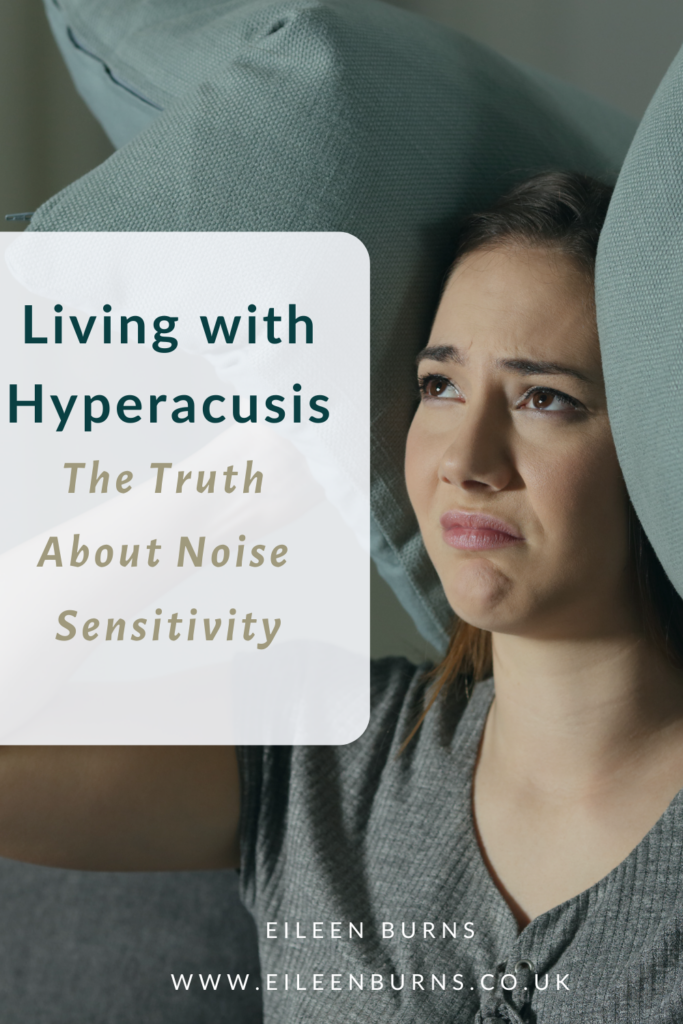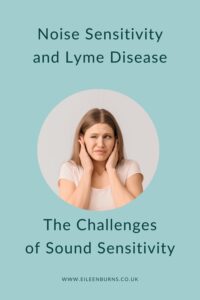The Truth About Noise Sensitivity And Painful Hyperacusis
When most people talk about noise sensitivity they often think of simply an annoyance to specific noises. But noise sensitivity can be an extremely painful and a huge disabling challenge for many sufferers, especially when noise triggers all sorts of challenges including seizures and movement disorders.
Something I know as I began suffering from a severe form of hyperacusis in my right ear over the last ten years, which made me mostly housebound.
Noise Sensitivity
As someone who is highly empathic and sensitive, and a bit sensory sensitive. I always had a slight intolerance to loud noise as long as I can remember. I always had challenges sleeping with even the slightest noise around me.
But this started to become a much bigger problem when it developed into a painful and debilitating severe form of hyperacusis. Especially when specific frequencies and certain vibrations around my right side began to trigger extreme pain in my right ear, major balance issue and a complex movement disorder including non-epileptic seizures that leaves me with little or no control over my body.

What Is Hyperacusis?
Hyperacusis – is usually linked with amplified sensitivity or auditory increase in the central auditory system which is the hearing pathways of the brain. A “collapsed tolerance to normal environmental sound” The Hyperacusis Network.
It is suggested that unexpected exposure to deafening noise can sometimes trigger hyperacusis.
But there are also some medical conditions commonly associated with hyperacusis which include Bell’s palsy, Lyme disease, migraine, post head injury syndrome and William’s syndrome.
Also many people with hyperacusis have tinnitus and many with tinnitus have hyperacusis.
2 Types Of Hyperacusis Sound Sensitivity
There are two main known forms of hyperacusis;
Cochlear Hyperacusis and Vestibular Hyperacusis
Cochlear Hyperacusis;
annoyance, distress, ear pain and to very quiet or high-pitched sounds.
Vestibular Hyperacusis;
balance, postural control and vertigo problems, nausea, fatigue. Known sometimes as Audiogenic Seizure Disorder and Tullio’s syndrome
Hypersensitive Hearing
where someone is born with a hyper sensitivity to frequencies above 70 decibels normally viewed as problematic frequencies. This is common in the autism spectrum where noise sensitivity and sensory processing issues is a widely recognised issue.
Other Noise Sensitivity And Sound Issues
Misophonia –
is when someone hates a particular sound but it is not collapsed tolerance to sound. Usually there is an atypical limbic and autonomic nervous system response ( fight or flight response) which is related to the auditory system. Examples are repetitive sounds, consonants, sniffing, lip smacking which can often trigger emotional rage.
Phonophobia –
is a sub-category of Misophonia where one suffers anxiety/fear of events related to their noise sensitivity. Which triggers isolation in the outside world.
Recruitment –
is when there is an increased perception of noise sensitivity when someone is suffering from a type of hearing loss where they cannot hear certain pitches but can hear others. Which is perceived as too quiet to dramatically loud. This can accompany other sound issues.

Chronic Lyme Disease And Sound Sensitivity
My noise sensitivity issues appear to be caused by at least 30 years of bacterial/viral implications. But the cause is not clear with a complex medical history; M.E./CFS, suspected untreated chronic lyme at 14 years of age, head and face trauma, a rare cranial condition and survivor of sepsis.
Although according to Anthony Williams book the Medical Medium Many of these neurotoxicity symptoms are simply the fourth stage of very a rare form of Epstein Barr Virus. But I am unsure if I will ever know for sure as my health situations were very complex and included trauma to the jaw.
However the reality is noise sensitivity seems to be triggered by a variety of causes, diseases, accidents, trauma and stressors.
Sound Sensitivity In Highly Sensitive People
Sound intolerance also appears to be a common problem in those who are highly sensitive or have sensory processing disorders. Many clinicians used to assume noise sensitivity has a purely psychological basis. But more research and evidence is demonstrating many of the physiological causes behind various types of noise sensitivity.
Noise sensitivity challenges are very common for those with sensory processing challenges on the Autism/Asperger Spectrum. Which can seriously impact their quality of daily living, education and their careers.
Noise sensitivity is something that is certainly misunderstood and misdiagnosed by many medical practitioners. Especially as there is so many different classifications and causes of sound sensitivity.
Exploring Root Causes Of Your Noise Sensitivity:
Obviously managing and resolving your hyperacusis and noise sensitivity issues starts by trying to get to the root cause of your issue. Some people it is learning to get to the mental or emotional root of the trauma.
Some it is addressing nerve and TMJ issues there is more and more research demonstrating links to structural issues, damage to cranial nerves, and the stapedius muscle and its the tiny bones.
Addressing viral and bacterial infections as quick as you can such as Lyme and Lyme Co-infections is of importance, before they lead to long-term Neurological Complications.
Cranial Nerve issues is a common issue with untreated Lyme disease and other bacterial infections. Sadly I was over 30 years too late to be considered for medical treatment so I had to rely on holistic medicine for support.
Tips And Support For Noise Sensitivity Issues
Ear Plugs or Ear Phones:
For most types of noise sensitivity challenges recommendations are that ear plugs should not be relied on for day to day living. As there is suggestions that in the long run this may reduce tolerance to every day sounds.
Obviously this does depend on the type and degree of noise sensitivity. Since the issue I had was only in one ear and related to one side of the body I bought the dBud | Volume Adjustable Earplugs which I found very helpful. They helped me be able to work online and deal with extremely challenging noise much more better. Ear phones caused me pain and muscle spams.
Noise Cancellation Ear Phones:
Some people find noise cancellation useful, I find for long car drives they can cancel out and reduce some noise and can help reduce general over stimulation.
Pink Noise Devices:
For some types of noise sensitivity pink noise devices are used as a form of sound therapy.
helps you access that inner calm, peace inside despite what is happening around you. It helps you become more mentally, emotionally and physically resilient. Meditation has helped keep me so mentally strong over the last 25 years. It has helped me find my own equivalent to a power nap, when I can’t sleep due to noise issues.
Craniosacral Therapy –
can be helpful where there has been noise sensitivity after trauma to the head and neck. Also Bowen Therapy and Osteopathy is useful for again alignment issues due to trauma but make sure you get a therapist who has a deep understanding of your type of issue. I have found some bodyworkers caused me further issues.
Healthier Thinking –
it is important with any condition or life challenge that a person has the ability to look at their life challenges and focus on what they can do, rather than what we feel disabled by.
Managing Your Stress and Anxiety, regulating your Vagus Nerve is vital in dealing with any sort of pain, stress increased pain and inflammation, inflammation and pain can increase stress. Thankfully my areas of expertise was stress management, meditation and relaxation therapy. So I had made this is an even bigger priority in my daily healthcare.
Reducing Inflammation:
Do what you can to reduce any inflammation, by eating a clean healthy diet and avoiding toxins. I would suggest you get advise from a naturopath for any specific issues related to this. As it is important to get the right herbs for your individual needs. I have found Lemon Balm as a tincture helpful also CBD below. Also I found applying essential oils such as Lavender, Frankincense, to the nerves around my face and ear soothing.
CBD Oil:
Cannabis derived oil and paste is used by many who’s noise sensitivity appears to be related to their medical conditions. It is widely uses by Late- Stage Lyme Sufferers and now more popular in ME/CFS sufferers. Many people with noise sensitivity issues including those with sensory processing issues seem to be benefiting from CBD or marijuana in some component.
On Guard Blend: Another product that I have found helpful in my building my sound tolerance is the essential oil blend by doTERRA . These are highly vibrational essential oils which appear to strengthen our energetic boundaries, boost the immune system and protect our body against viruses and microbes.
Other Support Aids:
For me my noise sensitivity is also linked to vibrations around me and underneath me. Related to nerve damage down my right side of my body and back.
One of the biggest problems for me has been travelling in a car. Believe me some types of vehicles and weather is better than others.
But I have fond sitting and placing my feet on memory foam cushions and a duvet helps to cushion me from the impact of the vibrations which caused me a lot of pain and would make me more sensitive to noise. Some cars are more better than others in relation to the seat and height design.
Focus On What You Can Do:
Always focus on what you can do than what you can’t. Find new interests, new hobbies.
I am fortunate enough to start seeing slowly but surely a reduction in the severity of my symptoms. Having lived with chronic health challenges that have disabled me in various ways for many years. I choose to focus daily on my abilities, strengths and gifts. I am very fortunate to be able to do my work online. Although it can have its challenges, I do what I can to control my sound environment as much is required.
What I Have Learned About Noise Sensitivity
I used to work with a lot of children and teenagers who suffered from sensory processing issues and noise sensitivity. And even though I was aware of some of their challenges. I have to be honest it wasn’t until my symptoms became so extreme did I really understand the complexities, myths and misunderstandings around sound sensitivity.
Noise sensitivity can be extremely challenging, it needs more research/awareness especially on the actual conditions that cause it. But meanwhile the healthiest thing you can do is look after your own health and wellbeing, especially your anxiety and stress levels. As anxiety and stress will certainly make you more hyper-sensitive .
Also we focus on the things we can change and accept those we can’t. We come from a much stronger, calm and happier place.
If would love some one to one coaching or therapy to help you deal with these challenges, please just DM on Facebook or Instagram. Meanwhile, I hope you start to feel much better soon.







[…] sensitive people and those with sensory issues are often triggered by external stimuli such as environmental noise, information overload and […]
[…] denial? You see for the last seven years I have been living with rare health challenges including extreme sound sensitivity. So extreme sound and vibration trigger a very complex movement disorder. type seizure. Certain […]
Hey Eileen! This is a very informative post. Noise sensitivity is not to be taken for granted. I’m glad you’re doing better and choose to focus on what is good.
Cheers!
Thank you for sharing all this information. I’ve been struggling so much with this the last couple of years. I will try your suggestions. All the best to you!
[…] sensitive child/person has such heightened awareness than those around them. That they can see, hear, feel and interpret things to a greater degree than most people couldn’t […]
[…] I find too much EMF exposure can play havoc with my central nervous system at times. And find too much noise and busyiness extremely physically and mentally exhausting. You just need to look at a child with […]
This article is beyond informative! I am severely sound sensitive, and these are some great tools for me to practice. I also sent this article to my husband, because he doesn’t understand it at all, and I think this explains it so well.
Hi Anna I am so glad you found it helpful and I really hope your noise sensitivity challenges decrease. It is cerainly not pleasant.
x